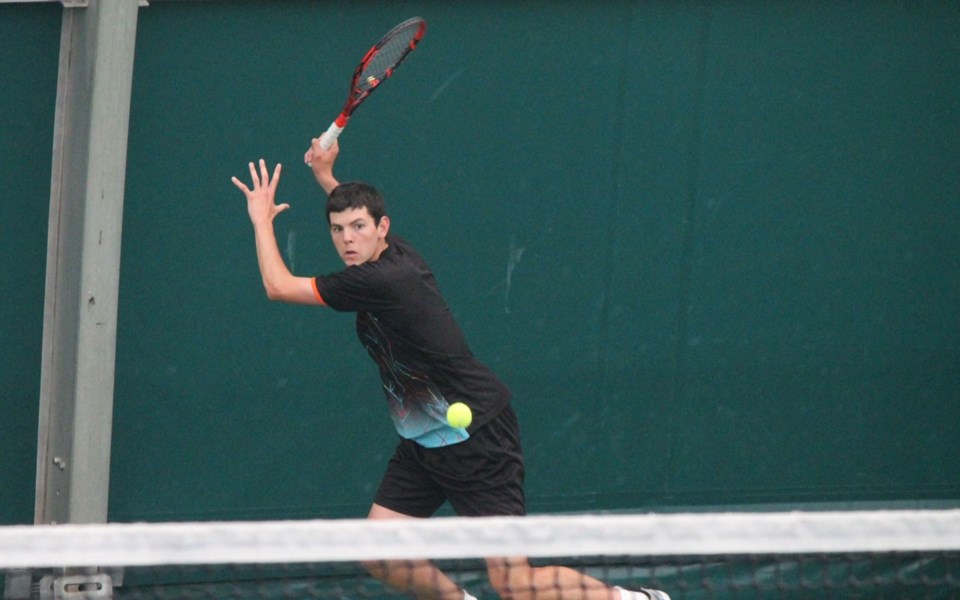Frustrated by a promise of a new world-class tennis centre that has been put off for more than 30 years, the Whistler Tennis Association (WTA) submitted a report to Resort Municipality of Whistler (RMOW) council pleading its case.
Authored by WTA treasurer Ben Cherniavsky and entitled
The Future of Tennis in Whistler: Securing the Next Century, the report was part of the RMOW council package for its Sept. 17 meeting.
It argues that tennis is a growing sport in Canada and around the world, but Whistler is missing an opportunity to harness that energy given the state of the current facility.
Cherniavsky, a part-time Whistler resident for 12 years and a regular visitor before that, said he and his family are all avid tennis players. Having recently joined the WTA board, he wanted to make a contribution straightaway, hoping to capitalize on the rise of Canadian tennis led by 2019 U.S. Open champion Bianca Andreescu and helping the club to realize its potential.
"This is a critical point for us. We've got to make sure that our point is heard," he said. "I thought it would be helpful, then, to write something.
"It's not asking for money or anything like that. We're just trying to make the community aware of the benefits, economic, social and lifestyle benefits that the centre has in the community."
The club has been hamstrung by challenges developing the Northlands Boulevard-based land on which it sits. In 1988, at a time when the municipality approved development in exchange for building amenities, Park Georgia was granted the right to develop a 1,200-bed-unit hotel and spa if it also built a world-class tennis facility. At the same time, the Fairmont Chateau Whistler and Nicklaus North golf courses were built under similar agreements.
While the current facility was built in 1993, it was intended to be a temporary structure. In 1998, Park Georgia intended to upgrade the facility as it moved forward with its hotel, but in 2002, sold the land to the Holborn Group. In 2005, Holborn applied to rezone the property for condominiums, townhouses and seniors housing. The application, which passed third reading, agreed to build a new tennis facility "complete with four new indoor courts and an exercise facility 60 per cent bigger than the existing one," Pique reported at the time. Club members, however, were disappointed as it was substantially less than initially promised.
In 2008, however, Holborn backtracked on development and sold the land to the Beedie Group in 2017.
"It's critical we get council onside with this because they're obviously going to be in charge of the zoning," Cherniavsky said. "Beedie Group, understandably, just wanted to develop the land and as far as I understand it, if the municipality wanted them to build a three-ring circus, they'd do that."
"We think it's important that the commitment that was made over 30 years ago to build a proper tennis facility is maintained to make sure that council and everyone in the community understands that."
As a small community, Cherniavsky said the WTA must work to draw visitors to make the facility viable, but it's doable. Whistler tends to rank among the provincial leaders in tournaments hosted, in the range of roughly 25 annually.
It's doing that even with aging facilities. Three of the club's outdoor courts are unusable, and the remaining four are headed in the wrong direction, Cherniavsky said. He measured 91 metres (300 feet) of cracks across the outdoor courts, and they appear on some that are still among the better ones.
"They're getting to be in a pretty bad state," he said. "They're not regularly maintained and power washed and they get quite slippery, even on a dry day, because the grit just builds up. The centre court does have benches for viewing, but they're growing weeds and cracked. The wood is cracking. It's 30 years old and rotting."
Inside, he explained, things aren't much better, as Wildwood Restaurant left in 2015 leaving the kitchen space vacant, and it's not an overly pleasant experience to be inside.
"The locker rooms are dark and the showers don't work. It's basic maintenance that you'd expect in a community facility like this and has not been up to the standard it should be for Whistler," he said. "The structure itself that covers the indoor courts, it leaks constantly, which disrupts play. It's dangerous. It's outlived its life. It was built to last 25 to 30 years."
Beedie Group executive vice president Houtan Rafii explained that with the Whistler official community plan (OCP) being outdated, it is impossible for the company to move forward with any development until a new one is approved.
"Until that OCP is adopted, we really can't bring forward any of our ideas with respect to redevelopment, nor can we really expect to receive feedback from [the municipality], whether that's at a council level or at a staff level or, equally important, at a public consultation level," he said. "We're just waiting patiently in the background, hoping and looking forward to when the OCP gets adopted and there's a policy framework in which we can work.
"For that OCP to be adopted is what gives us license to begin a transparent process."
An RMOW spokesperson said via email that staff has not had any recent discussions with Beedie and that the OCP remains on track for approval before year's end.




